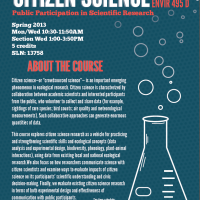Dear Students, Faculty, and Staff of the University of Washington,
Please feel free to pass this information along to friends, family, or acquaintances who you feel may have an interest in this program.
Do you love amphibians, science, and exploring National Parks? Then the Citizen Science Program is for you. The Citizen Science program gives volunteers the opportunity to hike and explore some of Mount Rainier’s remote lakes and wetland habitats while gaining experience in surveying and science. This year’s Citizen Science program will be starting up around late July and will run until mid-September.
We are looking for volunteers to help conduct amphibian surveys to document the presence or absence of amphibian species at various lakes, ponds and wetlands including historical Western Toad sites. As a volunteer you would be part of a small group that will hike to pre-determined sites and help conduct amphibian surveys. You do not need any previous experience and surveying equipment will be provided. You may volunteer once or multiple times throughout the season. If you need to stay overnight for a few days, free camping is available at Cougar Rock, White River, Ohanapecosh and Longmire campgrounds, however, there is no long term housing available. We are conducting both day trip and overnight backpacking surveys throughout the park.
If you are interested and available to volunteer during the time period from late July to mid-September then please email me back and indicate:
- Your phone number and preferred email
- Preference on volunteering for day surveys or overnight backpacking trip surveys
- Your experience and comfort level with hiking/backpacking
- Any physical limitations you may have
- Approximately what date or dates you are available
- Preference on which days of the week you prefer to volunteer (weekends, weekdays, etc)
I have added two attachments to this email that provide some additional information. If you choose to volunteer I will provide you with more details when I hear back from you!Please feel free to pass this information along to friends, family, or acquaintances who you feel may have an interest in this program. If you have any questions feel free to call me at (360) 569-6756 or email me at laura_davis@partner.nps.gov. I look forward to hearing from you!
Sincerely,
Laura Davis
Citizen Science Coordinator
Mount Rainier National Park
laura_davis@partner.nps.gov
(360) 569-6756




